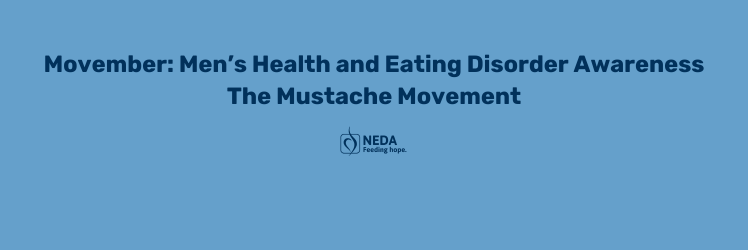The Mustache Movement
Kirsten Book, FNP-BC, PMHNP-BC
Movember is an annual event that takes place in November, during which men around the world grow mustaches to raise awareness about men’s health issues, particularly prostate cancer, testicular cancer, and mental health problems.
The November movement encourages men, known as “Mo Bros,” to start the month clean shaven and then grow and maintain a mustache throughout November in order to signify a commitment to men’s health.
The Movember community also raises money and awareness for mental health issues, eating disorders, and suicide. Men and male-identifying population have been underrepresented when it comes to seeking and receiving treatment for mental health and eating disorder treatment.
The American Eating Disorder Association reports that 10 million males will be affected by eating disorders in their lifetime. There is a sense of shame and a stigma that correlates with men and eating disorders. Men are also less likely to seek treatment, by the time they realize they need help their mental health conditions are often more severe.
Strength, dominance, control, and power are all but just some of the words often used to describe men in literature and in the media today. Estimates vary, but it is believed that a quarter to a third of those struggling with eating disorders are male. Disordered eating behaviors are also increasing at a faster rate in males versus females.
Muscularity Obsession
Society tends to focus on the need to be physically perfect exclusively directed at girls, but boys are now receiving just as much pressure. If you look at action figures and their exaggerated muscles in the chest and shoulders, the ideal male body portrays an unrealistic body to a young boy.
About 1 in 7 American men develop an eating disorder before turning 40 (Jama, 2019). Many messages that boys receive about working out to be stronger, faster, and more athletic develop into undue pressure to have a muscular physique. This can evolve into an eating disorder where males are obsessed with being “hypermuscular.”
Muscle dysmorphia, which is commonly known as “bigorexia” is when even when the individual is fit and muscular, they continually feel like they are insufficiently muscular and always attaining more.
In order to increase performance in a male sport, many times that requires a focus on nutrition, exercise, weight, and body image. Male sports such as wrestling are very vulnerable to dieting and working out to an extreme, in order to make a specific weight class, but also to improve their athletic performance.
Research has shown that nearly a third of teen boys in the United States report they want to gain weight and nearly a quarter of boys report taking supplements, steroids, or eating more to bulk up (Current Opinion Pediatrics 2020)
What Needs to Change
One of the biggest improvements that needs to be made is tailoring screening and assessment tools to address how eating disorders may present differently in boys and men. Since some boys or men may present with an obsessive desire for greater muscularity, it is inappropriate that clinicians are using questionnaires that are designed specifically for females.
More education and awareness on eating disorders in males is needed in order for families and friends to be able to monitor if their loved one’s behavior is indeed crossing over into eating disorder behavior.
Even some clinicians may overlook signs of eating disorders in men because many of the symptoms may present differently. Changing the screening measures for the male eating disorder population is the first step to help become more inclusive.
Kirsten Book, FNP-BC, PMHNP-BC, is a dual board-certified family nurse practitioner and psychiatric nurse practitioner who specializes in treating adolescents and adults struggling with eating disorders, substance use, and co-occurring disorders. Not only does Kirsten have the education and clinical experience, but she also is in recovery from an eating disorder. She uses her own personal experience to draw empathy, compassion, and humility when working with her patients. Kirsten has the unique opportunity to help improve an individual’s mental health, by not only utilizing medications and psychotherapy, but also by instilling hope, which she believes is just as powerful and effective as what any medication can do. Kirsten has an outpatient private practice in Chicago, Illinois. She also is licensed to practice in Arizona and Washington. Kirsten is also the Medical Liaison for IAEDP (International Association for Eating Disorder Professionals), and she speaks at local schools to help educate the adolescents and staff about eating disorder prevention and treatment.
Sources
Ward ZJ, Rodriguez P, Wright DR, Austin SB, Long MW. Estimation of eating disorders prevalence by age and associations with mortality in a simulated nationally representative US cohort. JAMA Netw Open. 2019;2(10):e1912925. doi:10.1001/jamanetworkopen.2019.12925
Nagata, J. M., Ganson, K. T., & Murray, S. B. (2020). Eating disorders in adolescent boys and young men: an update. Current opinion in pediatrics, 32(4), 476–481. https://doi.org/10.1097/MOP.0000000000000911





